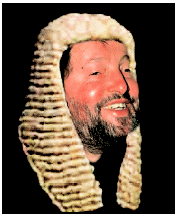

 A few millennia ago, the Greek
philosopher Aristotle is supposed
to have said, "the law
is reason free from passion." Home
Secretary David Blunkett has probably
never heard this statement
before, or if he has, he is doing a
wonderful job of concealing it. His
fire-breathing Draco has incinerated
the sacrosanct lines of democracy
by imposing "guidelines" by which
judges should sentence murderers.
These lines are the borders that
divide the legislative, the executive,
and the judiciary of a government.
And David Blunkett toddles over
them as frivolously as an unapologetic
footballer breaching the offside
rule.
A few millennia ago, the Greek
philosopher Aristotle is supposed
to have said, "the law
is reason free from passion." Home
Secretary David Blunkett has probably
never heard this statement
before, or if he has, he is doing a
wonderful job of concealing it. His
fire-breathing Draco has incinerated
the sacrosanct lines of democracy
by imposing "guidelines" by which
judges should sentence murderers.
These lines are the borders that
divide the legislative, the executive,
and the judiciary of a government.
And David Blunkett toddles over
them as frivolously as an unapologetic
footballer breaching the offside
rule.
The job of the legislative is to make
laws (Parliament), the job of the executive
is to carry out the laws (ministries),
and the job of the judiciary is
to interpret the laws (judges and
lawyers). The moment one branch of
government starts to take on the role
of another, they are in danger of gaining
too much power, hence defeating
the purpose of separating these powers.
This is not Mr Blunkettís first foray
across this great divide, but the general
public couldnít care less about the
extended detention of imaginary asylum-
seeking terrorists. Now, however,
he has stepped on all the right toes,
and the reactions are not at all salutational.
Politicians in parliament should not
be able to set jail terms for the simple
fact that they are accountable to the
population. This appears to be an
illogical paradox, but take the case of
Moors murderer Myra Hindley. She
had served the time recommended by
sentencing review panels, but she
stayed in jail well past the standard 25
years life term. This is because her
crime was so heinous that it captured
the morbid imagination of the public,
and to release her would be to release
the she-devil incarnate. Whether you
believe in the rehabilitation and penitence
of lifers or not, it is not the job
of the public to make this judgement,
simply because it is clouded by emotion.
A politician can sentence prisoners
based on reactions to the public
they are accountable to.
Court judges, on the other hand,
are not directly responsible to the public.
Judges swear, "to do right to all
manner of people after the laws and
usages of this Realm without fear or
favour, affection or ill will." This is the
spirit in which they must be allowed to
do their job. Another inconsistency of
David Blunkettís "recommendations"
is the differing sentences depending
on who has been murdered, and in
what manner the murder has taken
place.
Convicts will get "life meaning
life", if the murders involve child sex,
and terrorism, a minimum of 30 years
for racist murderers and contract
killers, with the rest starting at a minimum
of 15 years. This might be an
area for criminologists, but why should
a contract killerís premeditation be
considered graver than an ordinary
murdererís lack of simple self-control
in so called "crimes of passion?" Mr
Blunkett seems to caught up in the
melodrama of murder, with sentences
being Oscars for quality in the theatre
of crime scenes, protagonists and
antagonists. Where child sex and terrorism
are the biopics and disability
features in the Home Office Judicial
Academy Awards.
The solution is simple - allow
judges to judge and use their discretion.
If there are problems with the
statutes of law, they must be tackled
by parliament, and interpretation must
be left to judges. Once these lines
cross, independence and trust begin to
diminish. This must not be allowed to
happen to our government.

|
